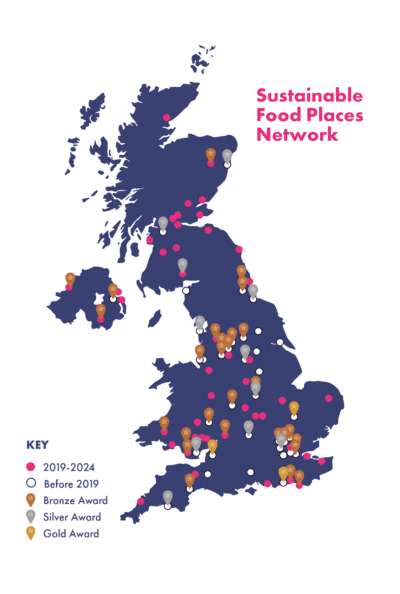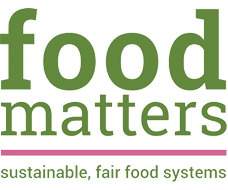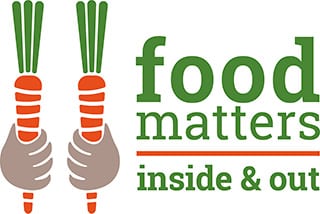Food Matters policy asks to the new government administration
We are calling on the new government administration to take a strategic approach to food, thinking about the multiple impacts on climate change, the health of the nation, biodiversity and our communities.
If you want to see what the main four parties’ manifestos say about food, then read this document.
These are our top 5 policy asks!
1. A cross-cutting food strategy
The independent national food strategy (2021) details the climate crisis caused by the current food system, and it provides broad evidence supporting transformational change towards a food system that fosters better health for people, the economy and the planet. Alongside the climate emergency the obesity crisis is affecting ever higher numbers and will continue to grow if current food trends continue. Obesity policy in the UK is fragmented and generally not considered in the context of climate change. If this continues, obesity and the climate crisis will continue to impact those communities least well equipped to buy and consume healthier diets.
Improving diet and increasing activity levels could reduce the risk of non-communicable disease and mental illness. Preventative measures could have a major impact on reducing the strain on the NHS.
We are calling on the new government administration to:
- Build on the widely supported independent National Food Strategy, by providing accountable leadership and mechanisms for food policy and
- Commit to resourcing comprehensive strategic actions to address food and farming systems challenges through a lens of climate, nature and food related health issues.
- Prioritise a national strategy to tackle non-communicable disease through diet and activity.
2. A food partnership in every local authority

Graphic by Clare Daniels (CSDesign)
We are a partner on the Sustainable Food Places programme which supports a growing network of Food partnerships across the UK. Food partnerships are place-based organisations which work strategically across the food system; working with local authorities, farmers, businesses and the community.
Food partnerships have an incredible impact across the food system, transforming food governance, tackling food poverty, fighting climate change, and building more sustainable and resilient local food economies.
We are calling on the new government administration to:
- Support and fund the development of food partnerships in every area in the UK to catalyse sustainable change to the food system.
3. Better Public Food Procurement for improved health and a healthy planet
We know that food procured by Government significantly affects the health, wellbeing, and habits of the consumers of that food across the public sector1. Public food procurement impacts almost 24% of the population in England alone and given this is largely catering for people in hospitals, schools, care homes and prisons we can assume a significant proportion of that 24% are people facing forms of marginalisation and inequality.
Given the impact publicly procured food has on health, mental wellbeing, climate emissions, and the economy, we believe there is a raft of measures the next government can put in place to make the public purse work harder for people and the planet.
Quite rightly multiple food campaigning charities have highlighted the issues and opportunities around school food and hospital & care home food provision, but prisons and youth custody establishments are mostly absent. However, we know the prison population is set to grow over the next three years to over 100k, with the cost to the public purse for food alone estimated at £100 million per year. Using that money to provide better prison food is vital and will have multiple benefits including better prisoner outcomes, fewer victims of crime and a boost to the British food economy.
We are calling on the new government administration to:
- Improve and strengthen government procurement rules to include greater focus on sourcing local and seasonal produce by making health, sustainability and environmental standards mandatory, with no affordability opt out.
- Increase transparency and scrutiny of prison food through introducing mandatory nutrition guidelines.
- Monitoring and regulation of food standards in prison food through the Prison Inspectorates.
4. Provide regulation on health and sustainability of food
As recommend in the National Food Strategy the Food Standards Agency should take a wider remit as an independent food regulator. It would be key in driving forward an evidence-based strategy to seriously tackle the crisis of non-communicable disease including obesity and type 2 diabetes, and mental health.
The scope of the FSA regulation could also be widened to include a sustainability dimension, incorporating standards and regulation covering regenerative farming, shorter food chains and reductions in food surplus and waste.
We are calling on the new government administration to:
- Expand the role of the Food Standards Agency as an evidence-driven independent food regulator to include the health and sustainability aspects of food.
5. Address food insecurity by reviewing the benefits system

It is a lack of adequate income that means people cannot afford to buy healthy, nutritious food as well as cover all their other living expenses. People who are in the poorest households are those most likely to be in food insecurity. Whilst there is ‘in work’ poverty, the level of benefit payments is undeniably too low for most families’ weekly expenditure.
We support the Trussell Trust’s ‘Guarantee our essentials’ campaign, which is asking that the basic rate of universal credit be calculated to at least cover the basic costs of food, bills and travel.
We are calling on the new government administration to:
- Overhaul the benefits system and update it regularly; to ensure that the real cost of living is taken into account and the price of healthy food is covered
Food Matters policy asks to the new government administration
We are calling on the new government administration to take a strategic approach to food, thinking about the multiple impacts on climate change, the health of the nation, biodiversity and our communities.
If you want to see what the main four parties’ manifestos say about food, then read this document.
These are our top 5 policy asks!
1. A cross-cutting food strategy
The independent national food strategy (2021) details the climate crisis caused by the current food system, and it provides broad evidence supporting transformational change towards a food system that fosters better health for people, the economy and the planet. Alongside the climate emergency the obesity crisis is affecting ever higher numbers and will continue to grow if current food trends continue. Obesity policy in the UK is fragmented and generally not considered in the context of climate change. If this continues, obesity and the climate crisis will continue to impact those communities least well equipped to buy and consume healthier diets.
Improving diet and increasing activity levels could reduce the risk of non-communicable disease and mental illness. Preventative measures could have a major impact on reducing the strain on the NHS.
We are calling on the new government administration to:
- Build on the widely supported independent National Food Strategy, by providing accountable leadership and mechanisms for food policy and
- Commit to resourcing comprehensive strategic actions to address food and farming systems challenges through a lens of climate, nature and food related health issues.
- Prioritise a national strategy to tackle non-communicable disease through diet and activity.
2. A food partnership in every local authority
We are a partner on the Sustainable Food Places programme which supports a growing network of Food partnerships across the UK. Food partnerships are place-based organisations which work strategically across the food system; working with local authorities, farmers, businesses and the community.
Food partnerships have an incredible impact across the food system, transforming food governance, tackling food poverty, fighting climate change, and building more sustainable and resilient local food economies.
We are calling on the new government administration to:
- Support and fund the development of food partnerships in every area in the UK to catalyse sustainable change to the food system.
3. Better Public Food Procurement for improved health and a healthy planet
We know that food procured by Government significantly affects the health, wellbeing, and habits of the consumers of that food across the public sector1. Public food procurement impacts almost 24% of the population in England alone and given this is largely catering for people in hospitals, schools, care homes and prisons we can assume a significant proportion of that 24% are people facing forms of marginalisation and inequality.
Given the impact publicly procured food has on health, mental wellbeing, climate emissions, and the economy, we believe there is a raft of measures the next government can put in place to make the public purse work harder for people and the planet.
Quite rightly multiple food campaigning charities have highlighted the issues and opportunities around school food and hospital & care home food provision, but prisons and youth custody establishments are mostly absent. However, we know the prison population is set to grow over the next three years to over 100k, with the cost to the public purse for food alone estimated at £100 million per year. Using that money to provide better prison food is vital and will have multiple benefits including better prisoner outcomes, fewer victims of crime and a boost to the British food economy.
We are calling on the new government administration to:
- Improve and strengthen government procurement rules to include greater focus on sourcing local and seasonal produce by making health, sustainability and environmental standards mandatory, with no affordability opt out.
- Increase transparency and scrutiny of prison food through introducing mandatory nutrition guidelines.
- Monitoring and regulation of food standards in prison food through the Prison Inspectorates.
4. Provide regulation on health and sustainability of food
As recommend in the National Food Strategy the Food Standards Agency should take a wider remit as an independent food regulator. It would be key in driving forward an evidence-based strategy to seriously tackle the crisis of non-communicable disease including obesity and type 2 diabetes, and mental health.
The scope of the FSA regulation could also be widened to include a sustainability dimension, incorporating standards and regulation covering regenerative farming, shorter food chains and reductions in food surplus and waste.
We are calling on the new government administration to:
- Expand the role of the Food Standards Agency as an evidence-driven independent food regulator to include the health and sustainability aspects of food.
5. Address food insecurity by reviewing the benefits system
Food insecurity affects at least 11 % of households in the UK and is even more prevalent in households with children. The Covid pandemic and cost of living crisis has driven up household bills as well as food, but the proliferation of food banks in the county demonstrably increased at the point when Universal credit was first introduced.
It is a lack of adequate income that means people cannot afford to buy healthy, nutritious food as well as cover all their other living expenses. People who are in the poorest households are those most likely to be in food insecurity. Whilst there is ‘in work’ poverty, the level of benefit payments is undeniably too low for most families’ weekly expenditure.
We support the Trussell Trust’s ‘Guarantee our essentials’ campaign, which is asking that the basic rate of universal credit be calculated to at least cover the basic costs of food, bills and travel.
We are calling on the new government administration to:
- Overhaul the benefits system and update it regularly; to ensure that the real cost of living is taken into account and the price of healthy food is covered





